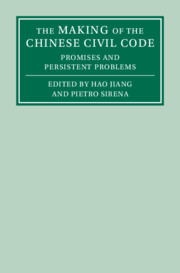Book contents
- The Making of the Chinese Civil Code
- The Making of the Chinese Civil Code
- Copyright page
- Dedication
- Contents
- Tables
- Contributors
- Preface
- Acknowledgements
- Abbreviations
- 1 The Making of a Civil Code in China
- 2 Personality Rights in China’s New Civil Code
- 3 Force Majeure or Change of Circumstances
- 4 Article 580 (2) of the Chinese Civil Code
- 5 Contractual Consent in the New Chinese Civil Code
- 6 The Security Interests in Chinese Law
- 7 Chinese Tort Law in the Era of the Civil Code
- 8 Causation in the Chinese Civil Code
- 9 The Aims of Tort Law across China and the West
- 10 Classifying the Passive Appreciation of Separate Property during Marriage in the Chinese Civil Code
- 11 The Rule of Law in Traditional China
- 12 The Private Law Influence of the Great Qing Code
- 13 The New Validity Rules in Chinese Civil Code and Chinese State-Owned Enterprises’ Freedom in Contracting
- 14 Chinese Civil Law and Soviet Influences
- 15 The Connections between Roman Law and Chinese Civil Law
- Index
6 - The Security Interests in Chinese Law
Some Nuances
Published online by Cambridge University Press: 31 August 2023
- The Making of the Chinese Civil Code
- The Making of the Chinese Civil Code
- Copyright page
- Dedication
- Contents
- Tables
- Contributors
- Preface
- Acknowledgements
- Abbreviations
- 1 The Making of a Civil Code in China
- 2 Personality Rights in China’s New Civil Code
- 3 Force Majeure or Change of Circumstances
- 4 Article 580 (2) of the Chinese Civil Code
- 5 Contractual Consent in the New Chinese Civil Code
- 6 The Security Interests in Chinese Law
- 7 Chinese Tort Law in the Era of the Civil Code
- 8 Causation in the Chinese Civil Code
- 9 The Aims of Tort Law across China and the West
- 10 Classifying the Passive Appreciation of Separate Property during Marriage in the Chinese Civil Code
- 11 The Rule of Law in Traditional China
- 12 The Private Law Influence of the Great Qing Code
- 13 The New Validity Rules in Chinese Civil Code and Chinese State-Owned Enterprises’ Freedom in Contracting
- 14 Chinese Civil Law and Soviet Influences
- 15 The Connections between Roman Law and Chinese Civil Law
- Index
Summary
Upon the enactment of Chinese Civil Code, the previous rules that allowed for enlarged state power to annul contracts were dropped. Chinese law has gone one step further in promoting freedom of contract. The validity rules have been streamlined and the previous contradictory and inconsistent treatment between civil juristic acts and contracts, state and private parties eliminated. However, the new legislative technique will unavoidably facilitate asset stripping, the very reason that the paternalistic rules were in place. Through a historical, doctrinal, and logical lens, we will show why there can be no effective model of a neutral set of validity rules that deals with state-owned enterprises in a less than free and competitive market. The only way to make it work is to have SOEs exit most of the competitive industries and focus on areas that serve the policy goals. Also, paternalistic rules concerning the validity of a contract in trading state-assets should be enacted either in the Civil Code or through special legislations and applicable to government, state-owned enterprises and private parties alike
Keywords
- Type
- Chapter
- Information
- The Making of the Chinese Civil CodePromises and Persistent Problems, pp. 131 - 152Publisher: Cambridge University PressPrint publication year: 2023



